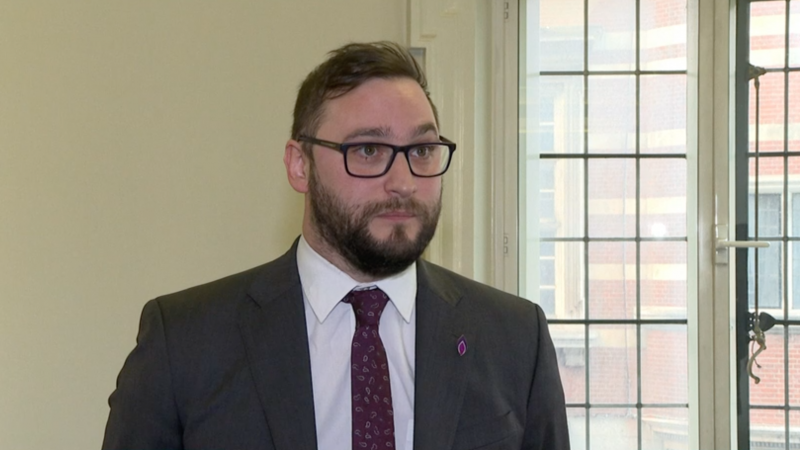
Christian Wakeford today defected from the Conservatives to the Labour Party. Some have wondered whether his politics fit with Labour’s values. Let’s take a look at what we know about the MP from his parliamentary record…
1. Universal Credit
Wakeford abstained on Labour’s opposition day motions calling on the government to drop its £20-per-week cut to Universal Credit, which campaigners said at the time would push 730,000 children below the poverty line.
Soon after becoming Prime Minister, Boris Johnson adopted a policy of ignoring opposition day motions, which are not binding on the government, and whipping Conservatives not to take part in votes. Wakeford was following the Tory whip.
Writing in a WhatsApp group consisting of the Red Wall Conservative MPs at the time of the debate over the welfare cut, the MP reportedly called Labour “a bunch of c***s” over its opposition to the Universal Credit reduction.
2. Immigration and foreign affairs
Wakeford welcomed the nationality and borders bill, which Labour opposed, as “the cornerstone” of the government’s plan for immigration. He said it would deliver “the most comprehensive reform in decades” of the “broken asylum system”.
He said Labour “no longer represents those [Red Wall] working-class communities” on immigration and asylum seekers were “not just travelling through one safe country” but “have a shopping trolley as to what they want”.
Wakeford criticised Labour MPs’ opposition to mass deportations, describing the opposition party as “more concerned about stopping the deportation of foreign criminals than keeping our streets safe”.
He opposed the Tory cut to the international aid budget, which saw ministers retreat from the manifesto pledge to maintain spending at a rate of 0.7% of national income. He said restoring aid spending was the right thing to do “morally” and “for the UK’s national interest”.
The Bury South MP rebelled to back the ‘genocide amendment’ to the trade bill, which would have required the UK’s withdrawal from trade agreements with countries responsible for genocide. He said the amendment was “not perfect” but a “starting point” to address human rights concerns.
3. Policing and crime
Wakeford supported the police, crime, sentencing and courts bill, saying he was “proud” to back it. He accused Travellers of “extreme antisocial behaviour” and welcomed tougher sentencing for attacks on shop workers.
He criticised Labour for linking the bill to the Metropolitan Police’s handling of the Sarah Everard vigil, a woman murdered by a serving police officer, when an image emerged of an officer kneeling on the back of an attendee.
The MP described Labour’s position as “absolutely disgusting”, arguing that the party should be “truly ashamed”, and told parliament that the position taken by Labour was “not opposition” but “opportunism”.
Wakeford used a debate on Covid to urge ministers to ensure there is funding available for services supporting domestic abuse victims. He warned of the impact of lockdowns, which saw increased reports of domestic violence.
He also argued for stronger penalties for animal cruelty offences, saying the thought of cruelty to his pet filled him “with concern and dread”, and pushed the government to introduce more police officers across the country.
4. Free school meals
The government sparked controversy in October 2020 when it whipped Conservative MPs to vote against an opposition day motion to extend free school meals over school holidays. Wakeford did not cast a vote either way and did not speak in the debate.
Along with another MP, paper plates and signs such as ‘feed the kids’ were left stuck to the front of his office by anti-austerity protesters, Bury People’s Assembly, amid the controversy following the debate.
A spokesperson for the group said: “Over 8,000 children in Bury are eligible for free school meals and the fact that our MPs refused to vote to make sure that those children don’t go hungry over the school holidays is callous and irresponsible.”
5. Health and Covid
Wakeford vehemently opposed Covid vaccine passports in September 2021, telling the minister at the time: “I am flabbergasted, depressed and annoyed that we are even discussing this matter. It is absolutely wrong on a fundamental level.”
The Bury South MP defended the government over allegations of cronyism in the procurement process for personal protective equipment, and argued Labour had “used every opportunity throughout the pandemic to play politics”.
In a debate on the medical cannabis (access) bill last year, he argued for removing the exclusion of addiction from the Equality Act 2010 and “properly funding addiction and rehabilitation services”, telling MPs that the stigma of both drugs and alcohol addiction should be tackled.
Wakeford also backed amendments to the health and social care bill, put forward by Labour MP Dan Carden, to implement minimum unit pricing to help tackle harm caused by alcohol addiction.
6. Local government and planning
Wakeford attacked his Labour-led local council in Bury over its planning policy. He said the council had “no plan” and was not listening to residents over concerns relating to the protection of the green belt.
Referring to Labour’s opposition to the government’s planning reforms, he accused Labour MPs of expressing “faux outrage” and advised them to “turn lecture mode off and listening mode on”.
7. Brexit
Wakeford urged ministers to ensure that the transition period would end on December 31st 2020 as talks with were ongoing, arguing that people “simply want to remove the uncertainty that comes with prolonging negotiations”.
He supported the internal market bill, now an Act, which set out how the internal market of the UK would function once it had left the EU, and accused Labour of trying to “reduce the great ship Britannia to nothing more than a sluggish canal barge”.




More from LabourList
Delivering in Government: your weekly round up of good news Labour stories
‘Forgotten fathers: pipefitters, plumbers and the paternity pay gap’
‘How can Britain build peace for Palestinians without owning its own past?’